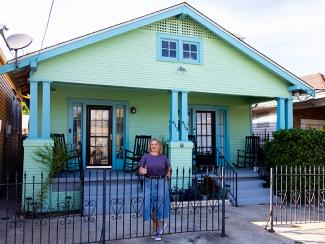Smith spearheaded the effort to get the home on the National Register, working closely with the Louisiana Division of Historic Preservation and the home’s current owner.
“My primary concern in this entire process was that I do justice to the history of this place,” Smith said. “I knew that if I could just do that, that the nomination would be accepted.”
After exhaustive study and coordination, Smith made a detailed presentation before the Review Committee of the Louisiana Division of Historic Preservation in August. The nomination was approved at the state level and then by the National Register office of the National Park Service in October.
For a property to qualify for the National Register, it must be at least 50 years old, retain sufficient architectural integrity to convey its historic period and have potential to yield important information. The Freedom House remains largely unchanged from the 1950s and ’60s, providing an immersive portal back to the Civil Rights era.

































































